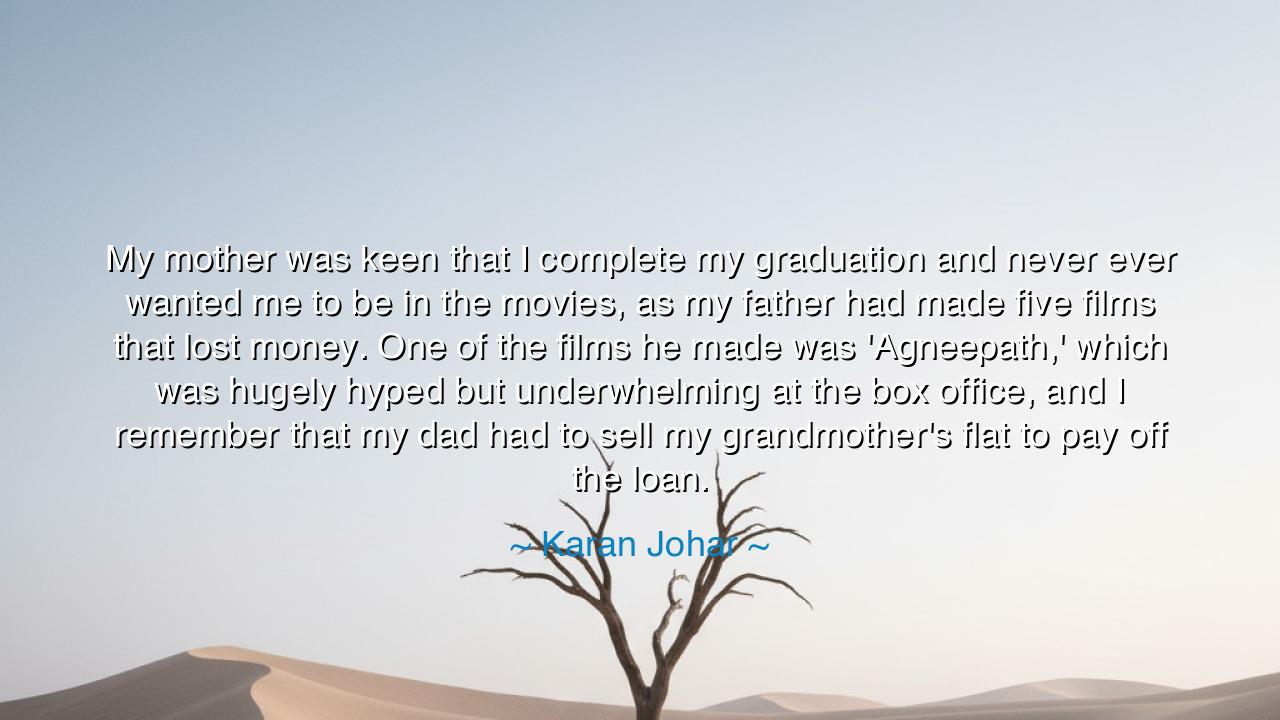
My mother was keen that I complete my graduation and never ever
My mother was keen that I complete my graduation and never ever wanted me to be in the movies, as my father had made five films that lost money. One of the films he made was 'Agneepath,' which was hugely hyped but underwhelming at the box office, and I remember that my dad had to sell my grandmother's flat to pay off the loan.






In the poignant words, “My mother was keen that I complete my graduation and never ever wanted me to be in the movies, as my father had made five films that lost money. One of the films he made was ‘Agneepath,’ which was hugely hyped but underwhelming at the box office, and I remember that my dad had to sell my grandmother's flat to pay off the loan,” Karan Johar reveals a truth that transcends art, family, and ambition — the eternal struggle between dream and duty, between the fire of passion and the fear of loss. Beneath his recollection lies not merely a tale of cinematic failure, but a universal story of sacrifice, inheritance, and the quiet resilience of those who build empires from the ashes of disappointment.
The origin of this quote lies in the heart of Karan Johar’s early life, long before he became one of India’s most celebrated filmmakers. Born into a family steeped in the film industry, he grew up witnessing both the glamour and the grief that came with it. His father, Yash Johar, was a producer of great vision but limited fortune — a man who dreamed nobly, yet bore the heavy cost of his own creations. When “Agneepath,” starring Amitabh Bachchan, released in 1990, it was meant to be the crowning jewel of Yash Johar’s career. Yet the film, though revered today as a cult classic, faltered at the box office. The financial blow was so severe that the family had to sell his grandmother’s apartment to cover debts. From that wound came a mother’s fear — Hiroo Johar’s resolve that her son should seek stability, not risk, that he should live free of the heartbreak the cinema had inflicted upon his father.
In this, the quote speaks to a universal theme: how the dreams of one generation become the caution of the next. It is the rhythm of history itself. The father who burns for vision teaches the son to fear the flame; the mother, who watches her world tremble under failure, clings to safety as salvation. Yet destiny, ever silent and stubborn, often calls the child back to the very fire his parents fled. So it was with Karan Johar. Though urged toward a secure path — education, graduation, respectability — his spirit could not rest. The world of stories, of emotions larger than life, still sang to him. He would one day return to the world that wounded his father, not out of defiance, but to heal its legacy.
The ancients would have seen in this tale the mark of inheritance both blessed and cursed — the idea that fate runs not only through blood but through calling. In Greek myth, the craftsman Daedalus built wings of wax for his son Icarus, warning him not to fly too close to the sun. Yet the boy, driven by awe and wonder, soared higher still — and fell. Every generation faces this same choice: to heed fear or to follow faith. Karan Johar’s words are not a lament, but an acknowledgment of both forces — the wisdom of his mother’s caution and the weight of his father’s sacrifice. They form the dual pillars upon which his own journey was built: prudence learned from loss, passion inherited from pain.
And when one looks upon Karan Johar’s later triumphs — films like Kuch Kuch Hota Hai, Kabhi Khushi Kabhie Gham, and Ae Dil Hai Mushkil — one sees not mere success, but redemption written through art. Each film, lush with emotion and familial devotion, carries the echo of his own story — a tribute to his father’s broken dreams and his mother’s steadfast love. It is as though through cinema, he sought to mend the wound that once divided his family from its own destiny. The very world that once took everything from them became the world he rebuilt — not for vanity, but for legacy.
The meaning, then, is not simply about cinema, but about life itself. Every person must someday confront the inheritance of fear — the invisible barriers erected by the pain of those who came before. Yet love, paradoxically, demands both protection and courage. Karan Johar’s mother shielded him with caution because she loved him. He honored that love not by obeying it blindly, but by transforming it — by proving that her fears could coexist with his dreams. This is the balance of generations: to carry the lessons of the past without letting them chain the future.
The lesson is clear and timeless: do not despise the caution of those who fear for you, nor let their fear silence the calling that burns within you. Every dream worth pursuing will cost something — time, money, comfort, or even the peace of those you love. But if your purpose is rooted in honor and guided by gratitude, your pursuit becomes not rebellion, but renewal.
And the practical action is this: honor your roots, but do not remain buried in them. Learn from the scars of those who came before, yet dare to build what they could not. If your parents feared the storm, it may be because they once stood in its center — and you, their heir, are called to rise above it. For as Karan Johar’s story reminds us, what one generation loses, the next may reclaim — not by erasing the past, but by redeeming it through courage, artistry, and love.






AAdministratorAdministrator
Welcome, honored guests. Please leave a comment, we will respond soon